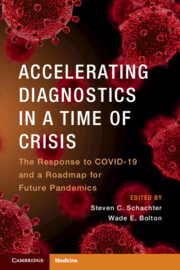 Accelerating Diagnostics in a Time of Crisis
Accelerating Diagnostics in a Time of Crisis Book contents
- Accelerating Diagnostics in a Time of Crisis
- Accelerating Diagnostics in a Time of Crisis
- Copyright page
- Dedication
- Contents
- Contributors
- Foreword
- Preface
- Acknowledgments
- Introduction
- Chapter 1 Early Detection, Response, and Surveillance of the COVID-19 Pandemic Crisis
- Chapter 2 Immunology of COVID-19 and Ineffective Immunity
- Chapter 3 Clinical Management: A Roadmap Based on One New York City Hospital’s Response to the COVID-19 Pandemic
- Chapter 4 Contribution of RADx® Tech to the Rapid Development of COVID-19 Diagnostic Tests
- Chapter 5 Coordination of Resources for the Manufacturing and Deployment of COVID-19 Diagnostic Assays
- Chapter 6 Quality and Risk Management Processes for Diagnostic Assays during an Emergency Pandemic Response
- Chapter 7 Development of Assays to Diagnose COVID-19
- Chapter 8 Laboratory Verification and Clinical Validation of COVID-19 Diagnostic Assays
- Chapter 9 Importance of Timely Sequencing, Tracking, and Surveillance of Emergent Variants
- Chapter 10 The RADx® Regulatory Core and Its Role in COVID-19 Emergency Use Authorizations
- Chapter 11 Commercialization and Market Assessment of COVID-19 Assays
- Chapter 12 Testing Strategies to Mitigate COVID-19 Disease Spread
- Chapter 13 A Pandemic Not Just of Infection but of Inequality: The Social Impact of COVID-19
- Chapter 14 Summary and Path Forward for Future Pandemics
- Index
- References
Chapter 10 - The RADx® Regulatory Core and Its Role in COVID-19 Emergency Use Authorizations
Published online by Cambridge University Press: 06 January 2024
- Accelerating Diagnostics in a Time of Crisis
- Accelerating Diagnostics in a Time of Crisis
- Copyright page
- Dedication
- Contents
- Contributors
- Foreword
- Preface
- Acknowledgments
- Introduction
- Chapter 1 Early Detection, Response, and Surveillance of the COVID-19 Pandemic Crisis
- Chapter 2 Immunology of COVID-19 and Ineffective Immunity
- Chapter 3 Clinical Management: A Roadmap Based on One New York City Hospital’s Response to the COVID-19 Pandemic
- Chapter 4 Contribution of RADx® Tech to the Rapid Development of COVID-19 Diagnostic Tests
- Chapter 5 Coordination of Resources for the Manufacturing and Deployment of COVID-19 Diagnostic Assays
- Chapter 6 Quality and Risk Management Processes for Diagnostic Assays during an Emergency Pandemic Response
- Chapter 7 Development of Assays to Diagnose COVID-19
- Chapter 8 Laboratory Verification and Clinical Validation of COVID-19 Diagnostic Assays
- Chapter 9 Importance of Timely Sequencing, Tracking, and Surveillance of Emergent Variants
- Chapter 10 The RADx® Regulatory Core and Its Role in COVID-19 Emergency Use Authorizations
- Chapter 11 Commercialization and Market Assessment of COVID-19 Assays
- Chapter 12 Testing Strategies to Mitigate COVID-19 Disease Spread
- Chapter 13 A Pandemic Not Just of Infection but of Inequality: The Social Impact of COVID-19
- Chapter 14 Summary and Path Forward for Future Pandemics
- Index
- References
Summary
The Rapid Acceleration of Diagnostics (RADx®) Regulatory Core was established as part of the National Institutes of Health (NIH)-funded RADx US response to the COVID-19 pandemic. The RADx Regulatory Core is charged with supporting COVID-19 in vitro diagnostic manufacturers admitted into the RADx program with the goal of obtaining Emergency Use Authorization (EUA) and planning for full authorizations to increase COVID-19 testing throughput on the US market. This chapter outlines the EUA process and how it differs from full authorization and describes the inception and evolution of the RADx Regulatory Core, including collaborations made with the NIH, the US Food and Drug Administration, and industry sponsors to successfully bring new tests to the market.
Keywords
- Type
- Chapter
- Information
- Accelerating Diagnostics in a Time of CrisisThe Response to COVID-19 and a Roadmap for Future Pandemics, pp. 194 - 210Publisher: Cambridge University PressPrint publication year: 2024


